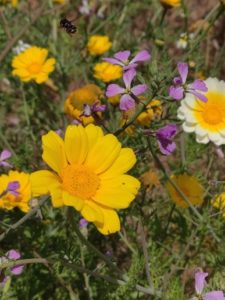Crouching Students, Hidden Urban Ecosystems

To view the photo-rich magazine version, click here.
Originally appears in the Summer 2021 issue.
By Elena Banks
The use of off-campus urban ecosystems is broadly supported by adopting and implementing some United States national and state standards for environmental education lessons and activities (see Appendix A). Many grade-level performance expectations emphasize living organisms’ interactions within an environment and how humans impact such natural systems.¹ The curriculum framework can provide you with a solid base to cover scientific practices through student observations and outdoor explorations as part of in-person or virtual teaching lessons, the likes of which many educators faced this past academic year.
I have found by slightly shifting my 5th-grade Science lesson or activity from a traditional indoor classroom setting to an outdoor, off-campus urban environment or green space, student learning has become more impactful. These memorable learning opportunities can give way to positive connections to the environment and future stewardship actions.2 Connecting students to nature and stewardship actions are important to natural green spaces in cities, not only for the health benefits associated with spending time outdoors, but also for protecting urban biodiversity at a regional level.3 The term “urban biodiversity” refers to the genetic, species, and ecosystem variation of plants and wildlife and how they interact with one another within an urban environment.4 Whether teaching virtually or through a hybrid in-person/virtual learning experience, students can still stop and take a look around and investigate urban biodiversity, from the insects crawling under their feet to the native plants growing in the cracks of the sidewalk.
This content is restricted to subscribers only.
If you are not yet a subscriber, please consider taking out a subscription here.
If you are an existing subscriber, kindly log in or contact us at info@greenteacher.com for more information.










